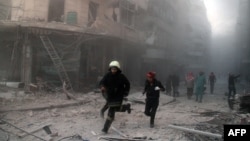Syrian government forces redoubled an air offensive on the outskirts of Aleppo over the weekend in a bid to sever supply routes of rebels battling to topple President Bashar al-Assad.
Warplanes carried out a series of attacks in the al-Jandoul and al-Castello districts of Syria’s second largest city, which is besieged on three sides by Syrian government forces with militants of the self-styled Islamic State holding part of the northeast edge.
Backed by Shi'ite fighters recruited from Iran and Afghanistan, the Syrian regime has focused for weeks now on the main rebel supply route into Aleppo that runs through the town of Afrin and then north to the Turkish border crossing at Kilis.
It is through this route into the west of the city that the rebels ferry in weapons, ammunition and medical supplies and take their wounded out for treatment in Turkey.
The loss of Aleppo by the Syrian rebels would be a huge symbolic blow for the uprising against Assad and would deliver a devastating setback to Western-backed rebels who are fighting on two fronts - against Assad and against the jihadists of the Islamic State, formerly known as ISIL, which controls the northeast entry points into Aleppo through its hold on the town of al-Bab.
Attacks on al-Bab
The Syrian air force also launched ferocious raids on al-Bab dropping so-called barrel bombs and killing 121 people, mostly civilians, according to the Syrian Observatory for Human Rights, a London-based pro-opposition monitoring group that relies on activists inside Syria for information.
With Syrian government forces pressing hard to complete the encirclement of the rebels in the city - the insurgents hold about half of Aleppo - Western-backed opposition politicians and rebel commanders favored by the Obama administration are scrambling to try to broker a deal to stop a severe bout of infighting among rebel factions that erupted last week.
They fear that unless the rebels unite and overcome their disputes - which range from ideological disagreements to rivalries over who controls which towns and roads - then Assad will succeed in encircling Aleppo and could then proceed to take back rebel-held districts in the city, dealing a demoralizing blow to the uprising.
Nasr al-Hariri, secretary general of the Syrian Coalition, met over the weekend with the leaders of 17 rebel factions to discuss the mounting attacks in the provinces of Aleppo and Idlib on secular and moderate Islamist militias grouped under the Western-backed Free Syrian Army.
Last week, jihadist rivals of the Islamic State group from the al-Qaida-affiliated Jabhat al-Nusra along with hardline Islamist rebels drove out moderate rebel groups from key strongholds in Idlib province to the west and northwest of Aleppo, accusing them of being “Western collaborators.”
One of the main rebel groups on the receiving end of the assault was the U.S.-favored secular brigade Harakat Hazm (The Steadfast Movement), which has received TOW anti-tank missiles from the Obama administration.
“We regret the current rebel infighting and self-attrition whose sole beneficiary is the Assad regime,” Hariri said in a statement. He added: “The revolution will achieve its stated goals only when politicians, citizens, and rebels combine their efforts.”
Islamist-leaning brigade
But a rebel commander, Abdul Rahman, a top commander in the 3,000-strong Jaysh al-Mujahedeen or Army of Mujahedeen, an Islamist-leaning brigade that emerged from the villages and towns of the Aleppo countryside, said he is doubtful a deal can be pulled off.
“We are working on trying to halt the infighting. If we don’t stop it, Assad will exploit it,” Rahman told VOA.
He warned that the divisions between rebel factions are worsening and he argued they are being aggravated by the U.S. strategy of focusing its air war in Syria on the Islamic State militants and ignoring Assad. “We can only solve all of these complications and arguments between the rebels, if the focus is on Assad,” Rahman maintains.
Rebel commanders have faulted the Obama administration for its decision just to target the militants of the Islamic State, who have seized a huge swath of eastern Syria and western Iraq, while excluding taking action against the Assad regime.
In announcing in September the U.S. military intervention in Iraq and Syria, President Barack Obama said the objective was to “degrade and ultimately defeat” the self-proclaimed Islamic State group.
Obama's special envoy to the Syrian rebels, Gen. John Allen, recently suggested that the Obama administration doesn’t think there can be a military solution to the Syrian civil war, which is now in its fourth year. He said the American plan is to train and equip Western-backed fighters to become a credible force able to compel the Assad regime to negotiate a political deal to end the conflict.
Infighting among rebels
The remarks dismayed rebel commanders.
They warn that the infighting against the fragmented spectrum of rebels - ranging from moderates to hardline Islamists and the militants of Jabhat al-Nusra - will, if unchecked, result in the complete disintegration of the secular and moderate Islamist forces. That would leave nothing to build on for the U.S. and Arab allies, who say they plan to train 5,000 rebel fighters a year.
The Western-backed political umbrella group the Syrian Coalition has called on the United States to intervene now when it comes to Aleppo with airstrikes to repel the regime’s attempts to encircle the city. Such a move, though, would widen U.S. and Western involvement in the conflict, something U.S. officials say they are loathe to do.
“The rebels have to fix themselves,” said a senior State Department official, speaking on the condition of anonymity. “We have tried before to help them shape themselves into a coherent, united force but each time the effort collapsed.”








